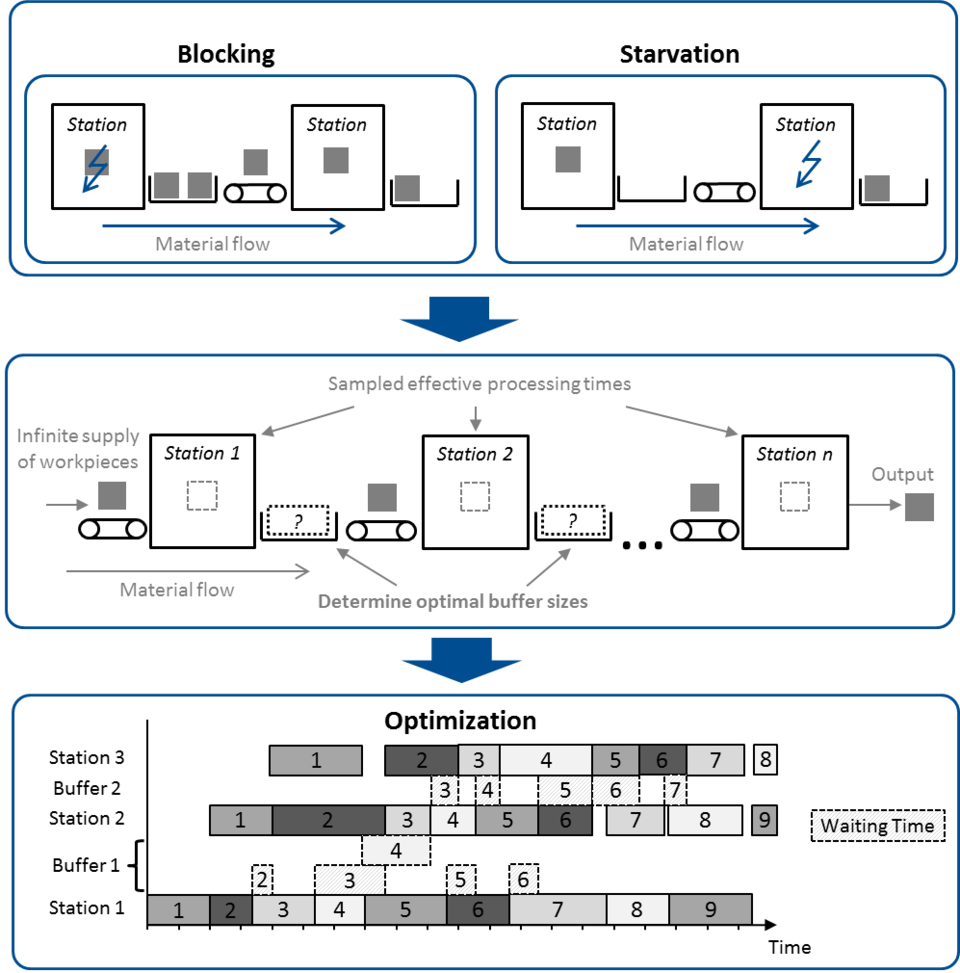
Dissertation Project
Optimization of buffer allocations in stochastic flow lines
Date of Defense
2 October 2015
Abstract
The allocation of buffers in a flow line with stochastic processing times has an important impact on the system's performance. Because stochastic processing times may lead to blocking or starvation, an efficient allocation is essential. My Ph.D. thesis deals with a mixed-integer programming approach to optimize the buffer allocation in flow lines with stochastic processing times. The objective is to minimize the overall number of buffer spaces reaching a goal production rate. To solve this model, the stochastic processing times are replaced by samples. The selection of the sampling method has a great influence on the sample size and, therefore, on the robustness and the computation time. Hence, several numerical studies are carried out to compare the different approaches. As the mixed-integer program is hard to solve, new solution approaches are developed to exploit the special structure of the model. Moreover, in many approaches, real-world features such as limited supply are not considered. The model considers this limited supply applying order policies for the replenishment of the first machine in the line. A numerical study evaluates the impact of the supply on the optimal buffer allocation.
Refereed publications
- Weiss, S., J. A. Schwarz, and R. Stolletz (2019): The Buffer Allocation Problem in production lines: Formulations, solution methods, and instances. IISE Transactions (formerly IIE Transactions), 51 (5), 456–485.
- Weiss, S., A. Matta, and R. Stolletz (2017): Optimization of buffer allocations in flow lines with limited supply. Forthcoming in, IISE Transactions (formerly IIE Transactions), DOI 10.1080/24725854.2017.1328751
- Weiss, S. and R. Stolletz (2015): Buffer allocation in stochastic flow lines via sample-based optimization with initial bounds. OR Spectrum 37 (4), 869–902.
Presentations at conferences, workshops, and research seminars
- Weiss, S. and R. Stolletz (2015): Optimization of buffer allocations in flow lines with limited supply. OR 2015, Vienna, Austria, September 2015 (supported by Julius-Paul-Stiegler-Gedächtnis-Stiftung).
- Weiss, S., A. Matta, and R. Stolletz (2015): Optimization of buffer allocations in flow lines with limited supply. 18th INFORMS Applied Probability Society Conference, Istanbul, Turkey, July 2015 (supported by Julius-Paul-Stiegler-Gedächtnis-Stiftung).
- Weiss, S., J. A. Schwarz, and R. Stolletz (2015): Buffer Allocation Problems for stochastic flow lines with unreliable machines. SMMSO 2015, Volos, Greece, June 2015 (supported by IPID4all funds of the DAAD).
- Weiss, S. and R. Stolletz (2015): Modeling of limited supply in flow lines. 7. Forschungsseminar für Supply Chain Management und Produktion, Obergurgl, Austria, March 2015.
- Weiss, S. and R. Stolletz (2015): A sample-based branch and bound algorithm for buffer optimization in stochastic flow lines. 25. Workshop für Quantitative Betriebswirtschaftslehre, Schwerte, March 2015.
- Weiss, S. and R. Stolletz (2015): Modeling of limited supply in flow lines. Brownbag Seminar Operations Management & Operations Research, Mannheim, February 2015.
- Weiss, S. and R. Stolletz (2014): Sample-based optimization of buffer allocations in flow lines with limited supply. 3rd Workshop on Queueing Theory, Obergurgl, Austria, December 2014.
- Weiss, S. and R. Stolletz (2014): Accelerating sample-based optimization methods of buffer allocations in flow lines. OR 2014, Aachen, September 2014.
- Weiss, S. and R. Stolletz (2014): Sample-based optimization of buffer allocations in flow lines with correlations. StochMod14, Mannheim, June 2014.
- Weiss, S. and R. Stolletz (2013): A branch and bound algorithm for the Buffer Allocation Problem. 2nd Workshop on Queueing Theory, Obergurgl, Austria, December 2013.
- Weiss, S. and R. Stolletz (2013): Solving the Buffer Allocation Problem by Benders Decomposition with initial bounds. EURO 2013, Rome, Italy, July 2013 (supported by Julius-Paul-Stiegler-Gedächtnis-Stiftung).
- Weiss, S. and R. Stolletz (2013): A Benders Decomposition approach for the optimization of flow lines with stochastic processing times. SMMSO 2013, Kloster Seeon, May 2013.
- Weiss, S. and R. Stolletz (2013): Efficient bounds for the Buffer Allocation Problem. 5. Forschungsseminar für Supply Chain Management und Produktion, Obergurgl, Austria, March 2013.
- Weiss, S. and R. Stolletz (2013): Efficient bounds for the Buffer Allocation Problem. Brownbag Seminar Operations Management & Operations Research, Mannheim, February 2013.
- Weiss, S. and R. Stolletz (2012): Efficient algorithms for the optimization of flow lines with stochastic processing times via sampling. Workshop on Queueing Theory, Obergurgl, Austria, December 2012.
- Weiss, S. and R. Stolletz (2012): Buffer allocation in stochastic flow lines using sampling approaches. StochMod12, Paris, France, May 2012 (supported by Julius-Paul-Stiegler-Gedächtnis-Stiftung).
- Weiss, S. and R. Stolletz (2012): Optimization of flow lines with stochastic processing times using sampling approaches. 4. Forschungsseminar für Supply Chain Management und Produktion, Obergurgl, Austria, March 2012.
- Weiss, S. and R. Stolletz (2011): An exact sampling approach to optimize flow lines. Brownbag Seminar Operations Management & Operations Research, Mannheim, December 2011.
